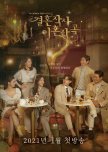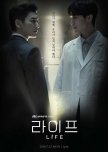
Never really lived up to its potential
Let me preface this review by saying that I believe people should be able to pursue love in defiance of heteronormative expectations. That being said, I’m very allergic to the “boys will be boys” patriarchal narrative designed to prevent accountability and protect men from the consequences of their actions. It’s an unethical stance that prevents mutual thriving of both partners in a relationship.I decided before settling down to watch this drama that I wouldn’t take the intellectually lazy option of making infidelity simply an issue about morals. It’s an undeniable truism that when it comes to cheating, no one can wreak your home alone. So I approached this wanting to look beyond the simplistic formula of hating the other woman and giving the husband a pass.
The storyline of Love (ft. Marriage and Divorce) is about the reality and complexity of married life and what happens when couples stop nurturing their marriage. We get to see what divides those willing to risk the love that they know for the fantasy they feel they lost along the way from the ones who love faithfully with all that they have and all that they are. In the end, I think one of the most important messages this drama imparts is this: there isn’t a certain kind of identifiable person who will cheat on their spouse.
The three main female characters, who work on a radio show together, are at different stages in their lives (one in her 30s, one in her 40s, one in her 50s) and are all having marital problems - whether they’re aware of it or not. Si-eun, the oldest and longest-married of the three is a dedicated wife and mother constrained, like many mothers are, by the cult of domesticity. She is the epitome of the “good wife” and conforming to this ideal means she is a selfless, sacrificial, self-neglecting caregiver. Her marriage to Park Hae-Ryun is a reminder of what unacknowledged sacrifice looks like.
In the scene before we meet Si-eun’s husband, we see Pi-young - the second oldest of the trio- berating her mother for what she perceives are her shortcomings. Their relationship is estranged because she thinks that her mother’s inability to forgive her father after he had an affair is what killed him. In defence of her father’s behaviour, she tells her mother: “Even I would been swayed by a sweet, kind hearted secretary if I had to come home to a difficult wife. It’s only natural. Rather than being a snob, if you had respected dad as your husband, he never would have cheated on you.”
The ensuing scene tests the veracity of this assumption. We see Si-eun, the good wife, stunned to silence by her husband's request that they end their marriage. His deceptive, and at times unnecessarily cruel, reasons for wanting to end their relationship demonstrates that being a dutiful spouse in a relationship doesn’t always guarantee a happy ending. In reality, Pi-young’s assumptions in the earlier scene about what makes a marriage work isn't always universal and sound rather naïve.
As we watch Pi-young’s relationship with her husband (Shin Yoo-shin) unfold, one thing that becomes very clear is that a man is going to do whatever he wants no matter how clean his wife keeps the house or how hot his meal is. Pi-young and Shin Yoo-shin’s marriage is a reminder of the pitfalls of putting men on a pedestal.
Hye-ryoung, the youngest of the group, thinks that her marriage to Pan Sa-hyun is going well until a rude awakening jolts her to the reality of her situation. Getting married quickly because you fall in love isn't always a good idea, which is why the saying “marry in haste repent at leisure” exists. Theirs is the most toxic of the three marriages because they both lack emotional maturity and have mismatched core values. After endless arguments, what Pan Sa-hyun seeks when he meets Song Won in the gym is mainly the validation of desirability.
Throughout this drama we witness how patriarchial and gendered socialisation impacts the lives of all three women. The actions of the husbands feel a lot like they’re rebelling against adulthood and their readily available symbols of settled male authority. Something which isn’t an option for their wives...because someone (read: a woman) has to ensure that the family’s domestic idyll continues to run like clockwork even if men chafe against the demands of marriage and domesticity. Unlike men, women hold space for the whole emotional story of the family and suffer a huge sense of guilt for not meeting the gender expectations of motherhood. Unlike men who succeed in identities that they define for themselves, women often try to succeed in identities defined for them by society.
There are other behaviours apart from infidelity that are harmful to a marriage and Yoo-shin’s stepmother Kim Dong-mi's passive aggression towards her husband is a stark reminder of this. Despite her outward displays of affection towards him, their relationship isn’t the domestic idyll of first impression. Being married to a man almost two decades older grates on her and we discover soon enough that her devotion to her spouse isn’t really about genuine affection but rather spurned on by the comfort & stability the marriage brings. I was stunned by her apathy and callous disregard for her him in his moment of need… Hello floor, meet jaw.
I expected some compelling drama when I clicked on this show and although it started off rather well, it never really lived up to its potential. I watched it till the end because the flaws of the marriages and their relatable human emotions kept me interested. However this drama has some obvious flaws, which is one of the reasons I haven’t rated it higher. Its main problems were bad editing and a lack of momentum from around half way in when flashbacks start to dominate the storytelling. Also, it's not clear if the intention of the drama is to criticise social norms in Korea or merely to entertain and entrench social attitudes. The ending felt rather rushed and contrived which makes me feel a bit weary about what lies ahead in season 2. Let’s hope the production lives up to its promise of exceeding viewers' expectations.
Was this review helpful to you?

I’m often drawn to stories that explore contemporary social issues, especially when those topics include the abuse of power and classism. At the heart of this drama is a power struggle in a hospital between ambitious doctors, many of whom believe ethics shouldn’t be conditional, and a new president with capitalist values. The relationship between both camps is hampered by a difference in values which becomes the running theme of a storyline that sees interests and ideals regularly collide.
One of the more memorable lines in the series which encapsulates this difference is delivered in an exchange between Dr Ye Jin Woo and President Go. In the scene the doctor berates his boss for his apathy, telling him that “hospitals…aren’t the equivalent of expensive sports cars, they aren’t places regular people can’t dream of entering.” I’m not normally a huge fan of medical dramas, but the characters in this series captured my attention. And held it.
I enjoyed the maturity of the storytelling because it’s character driven and doesn’t rely on erecting facile binaries between characters that eclipse their authenticity.
Jo Seung Woo as President Go is particularly memorable for his perfectly understated yet captivating performance. His character arc in the course of the 16 episodes is compelling, (as are his beautiful eyes) particularly as he begins to feel the influence of the doctors’ principled stance and disenchanted with the demands of the corporation he serves. His interactions with Dr Lee No Eul reveal his humanity but also the challenges that come with the position he occupies.
The relationship between Dr Ye Jin Woo and his paraplegic younger brother, Ye Sun-Woo, is the core of this drama and a heart-warming testament to just how wonderful it is to have a supportive sibling in your life. Ye Sun Woo’s determination to challenge the well-intended, but nonetheless annoying, infantalization of his disability is admirable. I enjoyed watching him fight for his independence as his grappled with facing an unresolved childhood trauma.
This drama series exemplifies why I enjoy Korean dramas so much. The acting is so seamless and realistic that it feels more like a feature film than a drama series. Its examination of how prioritising capitalist values can come at the expense of the ethical parts of running a business was totally captivating.
Life is DEFINITELY worth watching.
Was this review helpful to you?

An Opportunity Missed
This is a drama that promises a lot and has the ingredients to be awesome - but its problematic narrative, haphazard execution and difficulties with its plot line lets it down brutally. I’m a Kdrama enthusiast with an unholy amount of patience but this show defeated my better angels.This slice-of-life drama tells the story of three female protagonists – Mi-jo, Chan-young & Joo Hee – on the cusp of turning forty and navigating their way through the realities of life and love. Two of those realities are their common rejection of social and cultural expectations combined with their offers of unconditional support to each other as their special friendship is cruelly truncated by the terminal illness of one of the women.
On closer inspection, it’s a story with one protagonist, not three. A flaw which would have proved less lethal to a better written script. There are some important ideas here about love, friendship, family and loss but most of them are too thinly sketched and as a result lack emotional resonance.
The main character Mi-jo is played by Son Ye-jin, an actress whose performance I enjoyed immensely on CLOY, but even I spent a large part of my time while watching this drama wondering why she cried more often than Chan-Young, the character with a terminal illness. She is the biggest star in the series - but I felt that the huge spotlight on her character did a great disservice to this drama. It stunted it; whereas exploring the lives of the other female characters equally would have given this drama the much-needed boost it required.
Watching Mi-Jo make Chan-Young’s terminal illness about herself, with large parts of the drama dedicated to her feelings and how Chan-Young’s death is going to affect her felt paternalistic and annoying. I get that she’s a doctor - but I longed to see her decentre herself, restrain her easily wounded eyes and show her best friend empathy without paternalism.
My conclusion is that the plot of this show misses an opportunity. A deeply emotive story about a woman dealing with the distress of a terminal illness was sidelined in favour of an insipid romance (between Mi-jo & Seon-woo) that doesn’t draw you in any way. Not even the sight of Mi-jo’s boyfriend running to her rescue every time she needed a shoulder to cry on, like superman emerging from a phone booth, could make me stan their relationship. If I’m being entirely honest, I was glad they had fewer scenes alone by the time the story concluded.
Side note: the sight of their awkward amorous scene in the first episode of the drama was a sign to me not to expect much more in later episodes.
I have to say however that for the most part, the acting in this drama was of very high calibre – one of its saving graces. But it suffered from a weak desultory script; too many subplots were given less time than they deserved.
The final episode of this drama is its greatest achievement by far, although it was somewhat ruined by a) the decision to fast forward past the funeral ( why show a shot of a funeral in ep 1 that’s awaiting the characters as they reach the end of the season then gloss over it?) and jump straight to a happy scene afterwards and b) an accident which had been foreshadowed in earlier scenes but never materialised. The point of foreshadowing in a plot is to warn the viewer of something that will happen later.
The scene where Mi-jo watched Chan-Young’s last message to her was a poignant and moving depiction of grief. It was one of the few scenes where I felt an emotional connection to her character.
It would have been nice to see more of Joo Hee’s budding relationship with Hyun Joon and how her decision to forge ahead with her own business panned out. She is very much the third wheel in the friendship (and story) and of all the characters in the show, her storyline feels the most perfunctory.
Overall this isn’t a terrible show but I’d be lying if I said I’d watch it again or recommend it to someone else for that matter. The concept of the show reeled me in hook, line, and sinker but its execution left a lot to be desired.
This best thing about this show is its depiction of a friendship dynamic between three women which demonstrates that intimacy and closeness isn’t reserved just for romantic partners.
I say three women, but it’s Chan-young and Mi-jo’s closeness that REALLY shows just how much true friendship can be medicine for the soul; it’s about love, support and solidarity.
Close female friendships involve a deeper connection than male friendships because women share a deeper level of intimacy.
For many women, friendships are the greatest loves of their lives and the only reason this isn’t more celebrated is because women are socialised to prioritise romantic love.
But it is our friends who know us best and understand what truly brings us joy.
Our friendships are life sustaining partnership; they are about building a caring community with people who love you unconditionally.
Many of us will have romantic love come and go in our lives but we more often find that we have long lasting non-romantic love with our closest friends.
Was this review helpful to you?







